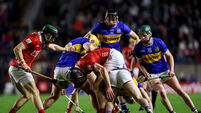War hero Kerry leaves Dean bloodied
Dick Gephardt went home to Missouri to drop out of the race later in the day. Officials close to the congressman said he will not endorse any of his rivals any time soon.
In the first blush after Mr Kerry's comeback victory in Iowa, when he joined Mr Edwards in burying the nationally-favoured Howard Dean in third place, the candidates avoided going after each other by name.














